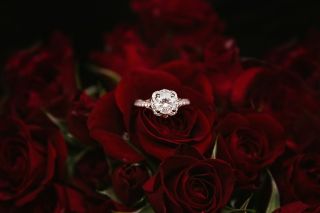Marriage
Why an Expensive Ring May Predict a Short Marriage
Higher wedding spending is linked to higher risk of divorce.
Posted February 22, 2024 Reviewed by Michelle Quirk
Key points
- Greater spending on engagement rings is related to shorter marital length.
- Similarly, couples with higher wedding expenses have a greater risk of divorce.
- If greater spending stems from impulsivity issues or creates financial distress, this may explain the pattern.

How much “should” you spend on engagement and wedding rings? If you’re anything like me, you’ve probably heard that two to three months’ salary is the rule of thumb; however, that’s a totally arbitrary “rule” and it’s one that few people actually seem to follow. In fact, what we see in the data is that for the average American, it’s closer to two weeks’ pay than two months’ pay.
Regardless of how much people actually spend, the idea is steeped in our culture that rings should be expensive because they’re seen as far more than just a piece of jewelry—they’re viewed as symbols of partners’ love and commitment to one another. But does it really matter how much you spend? Does the cost and size of a wedding ring actually have any bearing on the odds of relationship success and marital bliss?
Engagement Ring Expenses Predict Divorce
A study published in the journal Economic Inquiry sought to explore how wedding ring spending is linked to how long a marriage lasts—and what they found was that, if anything, more expensive rings actually tended to be linked to shorter marriages.
Researchers surveyed 3,151 adults who were age 34 on average. In total, 68 percent of participants were married and had never been divorced, whereas 32 percent were divorced. Participants were asked about their wedding expenses (and, separately, their engagement ring cost), as well as the length of their marriage.
There was a lot of variability in what people reported spending on engagement rings and whether they even had an engagement ring at all. That said, looking across gender, what the researchers found was that engagement ring expenditures were largely unrelated to length of marriage. However, certain categories of spending were linked to higher odds of divorce.
Specifically, among those who spent $2,000 to $4,000 on their ring specifically, the chances of divorce were higher. I should mention that—among those who had rings and knew the cost—the majority reported spending less than $2,000, so $2-4K is actually toward the high end of the scale; relatively few spent more than $4,000 on their ring.
Wedding Expenses Predict Divorce, Too
The researchers also found that those who spent the least on the wedding itself (less than $1,000, specifically) actually had a lower risk of divorce. By contrast, the most expensive weddings (those costing more than $20,000) were actually linked to greater risk of divorce, at least among the female respondents to the survey.
What all of this suggests is that spending more on engagement rings and weddings does not seem to be linked to longer-lasting marriages. If anything, the pattern tends to go in the opposite direction.
Why Greater Engagement and Wedding Spending Might Be Linked to Shorter Marriages
So how do we explain this pattern of results? Why is spending more on one's nuptials linked to shorter marriages?
One possibility mentioned by the study’s authors is that more expensive weddings and rings may be linked to taking on more debt—and, in turn, more stress about how to pay it off. In other words, perhaps economic distress or spending beyond one's means is the potential mechanism here.
Of course, it could also be that those who spent more might have more financial means and can therefore weather the financial costs of divorce more easily (and it's a well-known fact that divorce can be a very expensive proposition).
Yet another possibility is that those who spend more versus less are just different in various ways, such as in terms of their personalities and values or their reasons for getting married in the first place. For example, those who spend less might see the act of marriage itself (and not the fancy things that often go along with weddings) as the ultimate expression of their love.
It could also be that those who spend much more on their weddings might be more impulsive to begin with. And while this impulsivity might make for a more lavish celebration, it might also have negative consequences down the road. For example, great impulsivity might lead to more relationship disagreements or perhaps increase the odds of infidelity.
In short, we need more research to better understand this association, but these results are provocative in that they suggest that expensive rings and weddings don’t appear to be buffers against divorce or reliable indicators of greater relationship commitment.
Facebook image: Nejron Photo/Shutterstock
References
Francis‐Tan, A., & Mialon, H. M. (2015). “A diamond is forever” and other fairy tales: The relationship between wedding expenses and marriage duration. Economic Inquiry, 53(4), 1919–1930.




